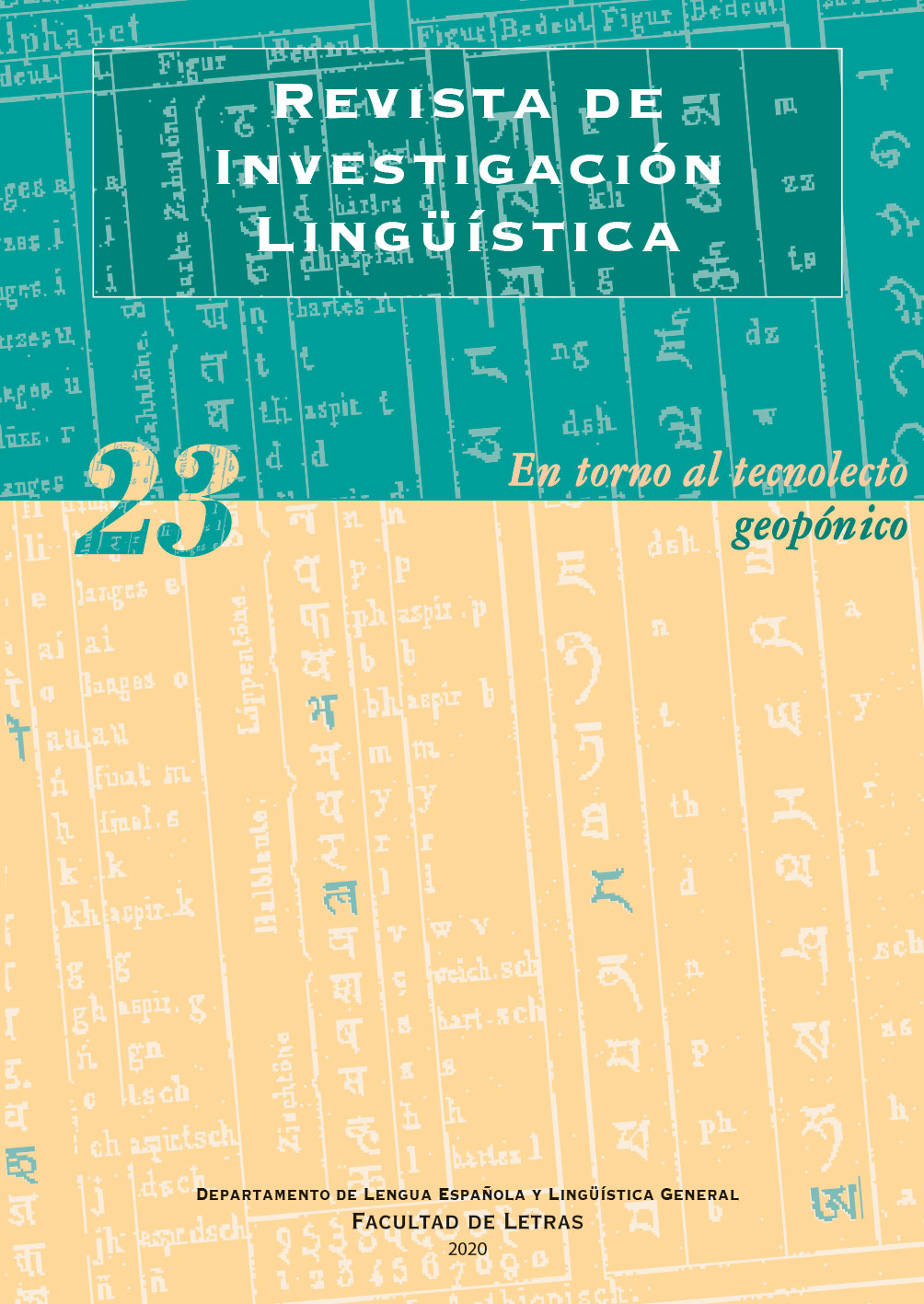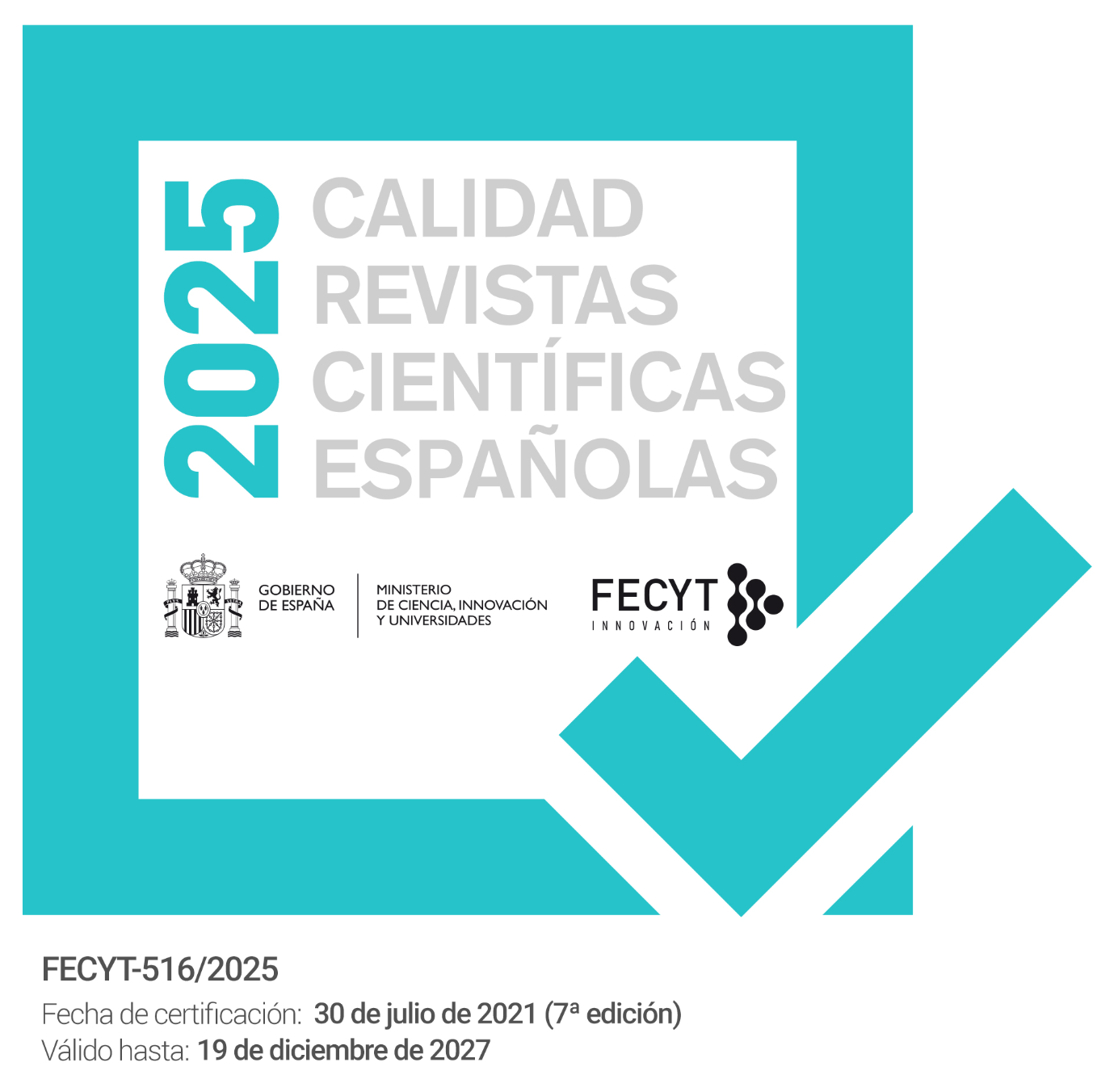From time to the knowledge of time. A study from the Spanish lexicon towards a dictionary of temporal units
Abstract
In this article we present some remarks with the aim to describe how time is represented in the mind from the viewpoint of language. While there is a plethora of bibliography on the study of verb tenses and the syntax of time, our research stems from the study of the lexicon, particularly in the Spanish lexicon. The analysis of our data led us to propose a particular way of understanding the concept of temporal unit, as well as a classification of these expressions and an understanding of the connections between them, thus constructing semantic networks. These findings will be collected and exhibited in the Diccionario de unidades temporales del español, a work in progress whose characteristics will be presented here.
Downloads
-
Abstract568
-
PDF (Español (España))516
References
Academia Nacional de Letras de Uruguay (2011): Diccionario del español
del Uruguay, Montevideo, Banda Oriental.
Bach, Emmon (1986): «The Algebra of Events», Linguistics and Philosophy, 9,
pp. 5-16.
Bello, Andrés (1847): Gramática de la lengua castellana destinada al uso de los
americanos, Santiago de Chile, Imprenta del Progreso.
Binnick, Robert (1991): Time and the Verb. A Guide to Tense and Aspect, Nueva
York, Oxford University Press.
Binnick, Robert (2012): The Oxford Handbook of Tense and Aspect, Nueva York,
Oxford University Press.
Bosque, Ignacio y Javier Gutiérrez-Rexach (2009): Fundamentos de sintaxis
formal, Madrid, Akal.
Bull, William (1960): Time, Tense and the Verb: a Study in Theoretical and Applied
Linguistics, with particular attention to Spanish, Berkeley, University of California
Press.
Cartagena, Nelson (1999): «Los tiempos compuestos», en Ignacio Bosque y
Violeta Demonte (dirs.), Gramática descriptiva de la lengua española, Madrid,
Espasa Calpe, pp. 2935-2976.
Comrie, Bernard (1985): Tense, Cambridge, Cambridge University Press.
Condoravdi, Cleo (2002): «Temporal Interpretation of Modals», en David
Beaver et al. (eds.), The Construction of Meaning, Stanford, CSLI Publications,
pp. 59-88.
Costa, Sylvia (2018): «El tiempo en el léxico del español», Lingüística, 34, 1, pp.
-60.
Costa, Sylvia, Cecilia Bértola, Hernán Correa, Victoria Furtado, Marina
Gómez, Macarena González, Carolina Oggiani y Ricardo Soca (2014):
«La representación de la temporalidad en el léxico del español», en Magdalena
Coll y Mario Barité (orgs.), Aspectos de lexicografía teórica y práctica:
una mirada desde el Río de la Plata, Montevideo, Facultad de Humanidades y
Ciencias de la Educación, Universidad de la República, pp. 39-50.
Costa, Sylvia, Cecilia Bértola, Hernán Correa, Victoria Furtado, Macarena
González, Carolina Oggiani y Ricardo Soca (2017): «La codificación
de la temporalidad en el léxico del español», en Belén Almeida Cabrejas, Ana
Blanco Canales, Jairo Javier García Sánchez y María Dolores Jiménez López
(eds.), Investigaciones actuales en Lingüística. Vol. II: Semántica, Lexicología y
Morfología, Alcalá de Henares, Servicio de Publicaciones de la Universidad de
Alcalá, pp- 37-50.
Costa, Sylvia y Victoria Furtado (2018): «Acerca de la representación del tiempo
y del espacio en el léxico», Revista de la Academia Nacional de Letras, 14,
pp 151-163.
De Miguel, Elena (1999): «El aspecto léxico», en Ignacio Bosque y Violeta Demonte
(dirs.), Gramática descriptiva de la lengua española, Madrid, Espasa Calpe,
pp. 2977-3060.
Evans, Vyvyan (2005): The structure of time, Amsterdam, John Benjamins Publishing
Company.
García Fernández, Luis (1999): «Los complementos adverbiales temporales. La
subordinación temporal», en Ignacio Bosque y Violeta Demonte (dirs.), Gramática
descriptiva de la lengua española, Madrid, Espasa Calpe, pp. 3129-3201.
García Fernández, Luis (2013): El tiempo en la gramática, Madrid, Arco/Libros.
Haspelmath, Martin (1997): From Space to Time: Temporal Adverbials in the
World’s Languages, München-Newcastle, Lincom Europa.
Hawking, Stephen (1990): Historia del tiempo, Madrid, Alianza Editorial.
Hawking, Stephen (2015): Brevísima historia del tiempo, Madrid, Crítica.
Jackendoff, Ray (1983): Semantics and Cognition, Cambridge, MIT Press.
Jackendoff, Ray (1990): Semantic Structures, Cambridge, MIT Press.
Jackendoff, Ray (1991): «Parts and boundaries», Cognition, 41, pp. 9-45.Kennedy,
Christopher y Louise McNally (2005): «Scale structure, degree
modification, and the semantics of gradable predicates», Language, 81, pp.
-381.
Kühl de Mones, Úrsula (1993): Nuevo diccionario de uruguayismos, en Gunther
Haensch y Reinhold Werner (dirs.), Nuevo diccionario de americanismos, Bogotá,
Instituto Caro y Cuervo.
Laca, Brenda (2010): «Temporalidad y modalidad», en Miguel Casas Gómez
(ed.), Actas de las Jornadas de Lingüística 2006, Cádiz, Publicaciones de la Universidad
de Cádiz, pp. 109-136.
Lombardi, Olimpia y Cristian López (2016): «La flecha del tiempo y la irreversibilidad», en Claudia E. Vanney, Ignacio Silva y Juan F. Franck (eds.),
Diccionario Interdisciplinar Austral. En línea: <http://dia.austral.edu.ar>
/06/2020].
Mani, Inderjeet, James Pustejovsky y Robert Gaizauskas (eds.) (2005): The
Language of Time, Oxford, Oxford University Press.
Moliner, María (1992): Diccionario de uso del español, Madrid, Gredos.
Morimoto, Yuko (1998): El aspecto léxico: delimitación, Madrid, Visor Libros.
Prigogine, Ilya (2012[1991]): El nacimiento del tiempo, Buenos Aires, Tusquets
Editores.
Prigogine, Ilya (1997): Las leyes del caos, Barcelona, Crítica.
Real Academia Española (2014): Diccionario de la lengua española, 23.ª ed.,
Madrid, Espasa.
Real Academia Española y Asociación de Academias de la Lengua Española
(2009): Nueva gramática de la lengua española, Madrid, Espasa.
Reichenbach, Hans (1948): Elements of Symbolic Logic, Nueva York, Academic
Press.
Reichenbach, Hans (1956): The Direction of Time, Berkeley, University of California
Press.
Rojo, Guillermo y Alexandre Veiga (1999): «El tiempo verbal. Los tiempos simples», en Ignacio Bosque y Violeta Demonte (dirs.), Gramática descriptiva de
la lengua española, Madrid, Espasa Calpe, pp. 2867-2934.
Seco, Manuel, Olimpia Andrés y Gabino Ramos (1999): Diccionario del español
actual, Madrid, Aguilar.
Valsgård, Pål (2007): Verbos transformativos y resultativos en castellano, Oslo,
Universidad de Oslo.
Vendler, Zeno (1957): «Verbs and Times», The Philosophical Review, 66, 2, pp.
-160.
Verkuyl, Henk (1972): On the Compositional Nature of the Aspects, Dordrecht,
Reidel.
Verkuyl, Henk (1989): «Aspectual Classes and Aspectual Composition», Linguistics
and Philosophy, 12, pp. 39-94.
Verkuyl, Henk (1993): A theory of aspectuality, Cambridge, Cambridge University
Press.
Wierzbicka, Anna (1972): Semantic primitives, Frankfurt, Athenäum Verlag.
Copyright (c) 2021 Journal of Linguistic Research

This work is licensed under a Creative Commons Attribution-NonCommercial-NoDerivatives 4.0 International License.
The works published in this magazine are subject to the following terms:
1. The Publications Service of the University of Murcia (the publisher) preserves the economic rights (copyright) of the published works, and favors and allows the reuse of same under the license of use indicated in point 2.
2. The papers are published in the electronic edition of the magazine under a Creative Commons Attribution-NonCommercial-NoDerivative 3.0 Spain license (legal text). Papers may be copied, used, disseminated, transmitted and publicly exhibited if the following requirements are met: i) The authorship and the original source of its publication (magazine, editorial and URL of the work) must be cited; ii) The works cannot be used for commercial purposes; iii) The existence and specifications of this user license must be explicitly mentioned.
3. Self-archiving conditions. Authors can electronically disseminate pre-print versions (version before being evaluated) and / or post-print versions (version evaluated and accepted for publication). This makes possible its circulation and diffusion earlier and with it a possible increase in its citation and reach among the academic community. RoMEO color: green.










